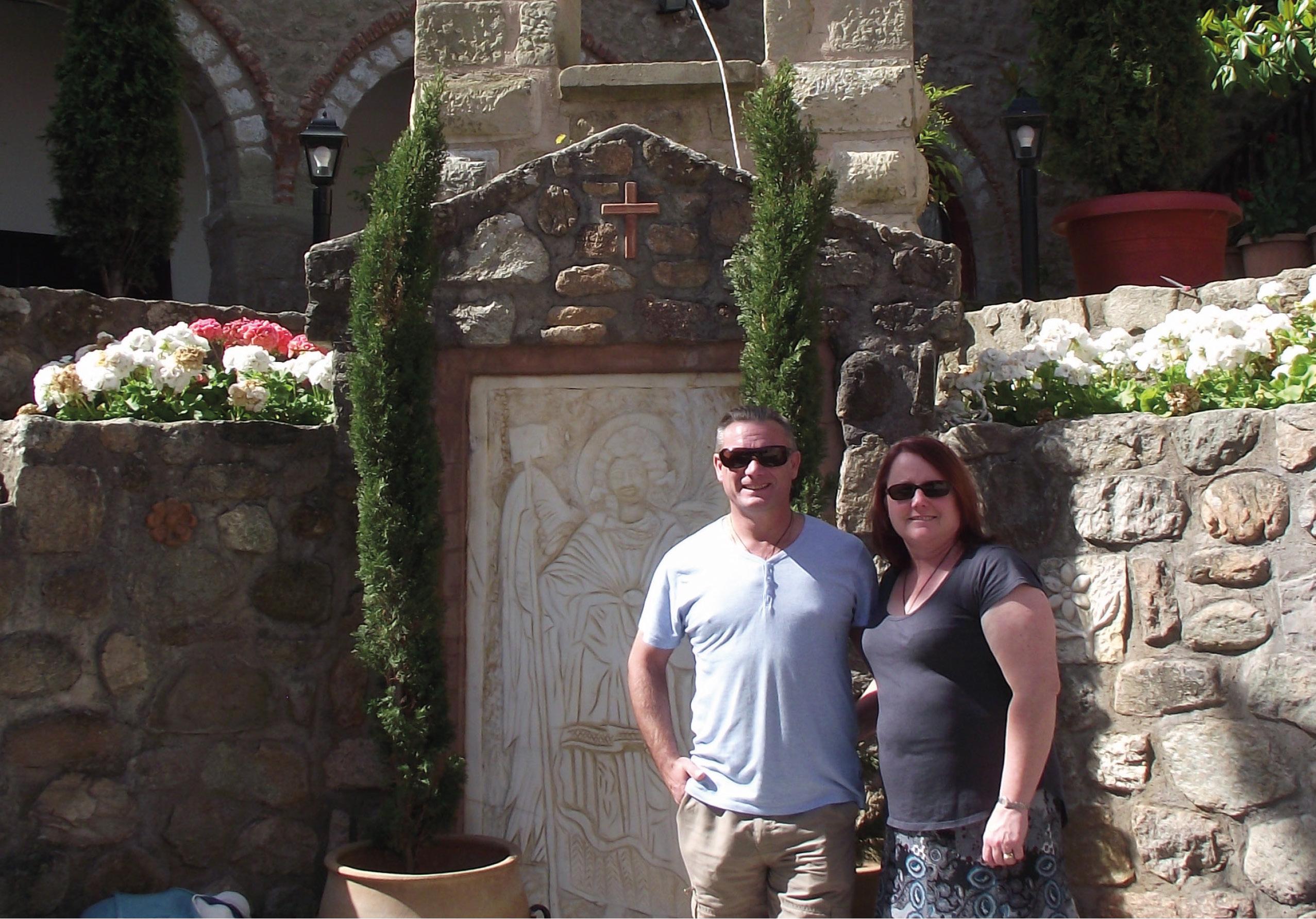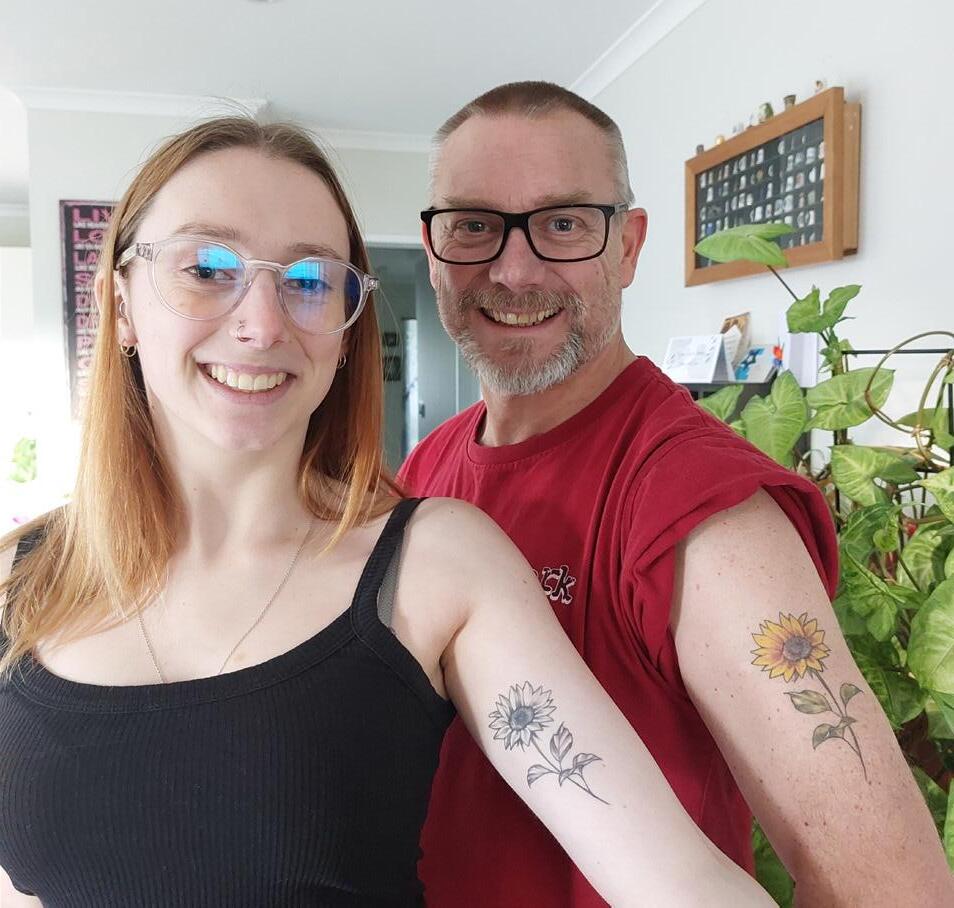
9 minute read
He Whakapono Pūmau A Resilient Faith
Just as King David fought lions and bears long before he faced Goliath, one could say that Major Perry Bray has been training his entire life to face scleroderma— a rare incurable autoimmune disease he was diagnosed with in 2018. Perry is facing this giant head-on, just like King David did.
WORDS Jules Badger
Perry’s dad served in the United Kingdom armed forces, meaning the family moved frequently. As a teenager Perry was sent to boarding school for some educational stability and while he had a positive introduction to God and church during this time, he soon faced an unexpected upheaval—his parent’s divorce. This resulted in further separation from his mother and brother as they moved to the United States after Perry finished his schooling.
The confusion and ensuing breakdown in relationship with his father saw Perry plunge into alcohol and drug addiction. But a chemically induced near-death experience was the wake-up call he needed.
Perry fled to his grandparents in New Zealand where he detoxed, and soon found solace in rep-football. It was during this season that Perry met his wife, Annette, completely changing the trajectory of his life.
Living the dream
‘Within five years we’d moved into our own home. I had a wife, car, dog—I had made it. I was living the dream! Not bad for someone who less than five years prior nearly threw any prospect of life away,’ reflects Perry.
Soon expecting twins, Annette had a difficult pregnancy. Her parents were attending East City Corps (Auckland) and unknown to Annette, she was being prayed for regularly. When the church sent flowers during one of her stays in hospital, Annette was deeply touched. She then began regularly attending church, and Perry was training to become the branch manager for a Warehouse store.
‘It felt as though whenever I had down time, Annette wasn’t around—she was at church or volunteering. Things were strained between us, and this is when I had my “Nineveh” moment. God was nudging me, but each time I was shoving him away into the corner. One day I felt a strong nudge after Annette had left for church, and I knew it was God and that if I wanted our relationship to work, I had better get to church. I walked through the door that day and instantly felt at home. It was like—wow! This is what’s been missing.’
Perry and Annette got involved and soon became part of the leadership team. It was during a trip to Chicago and the Willow Creek Leadership Summit in the early 2000s that Perry heard the clear call to full-time ministry as an officer (leader) in The Salvation Army. Once again Annette was way ahead of him, and so the couple applied and were accepted for training in the God’s Fellow Workers session. They took up their first appointment as leaders of Westport Corps in 2008.
Shaken but undeterred
Most Salvation Army officers find themselves in an appointment with significant challenges at some time during their years of service, but Annette and Perry had a successive string of them. In Westport they led the tight-knit community through the grief of three teenage road-related deaths, before the region was pummeled with a new anguish—the Pike River mine disaster. Then an appointment in Christchurch brought their family into the path of the Canterbury earthquakes, followed by a move to Invercargill Corps and a major building project and relocation of services. This decade-long season concluded with the unexpected and devasting death of a beloved corps leader. But God was at work, building resilience and teaching Perry and Annette to fully rely on him.
‘Whatever came our way, we trusted God to carry us through. Sometimes he carried us kicking and screaming, but we met the challenges head on and with God’s help didn’t let circumstances consume us,’ explains Perry. ‘We did what we could to help others, believing that reliance on God would enable us to accomplish what he needed us to do. From time to time, yes, we floundered a bit, but we always found a way because God was bigger than any issue or event life threw at us.’
It was towards the end of their time in Invercargill that a congregation member with a medical background noticed something wasn’t quite right with Perry. In September 2018, at 47 years of age, Perry was diagnosed with scleroderma, a rare autoimmune disease that is often progressive, currently incurable and has no known specific causes. Simply put, it is a thickening of the skin that affects the connective tissues and internal fibrous organs of the body, including muscles and joints, heart and lungs. Not only is scleroderma rare, but every case is unique because scleroderma is a disease that causes the body to attack itself, resulting in other conditions. Perry now also has interstitial lung disease (ILD), with the damage to his lungs much like that of asbestos poisoning.
Treatment options are limited, mixed and experimental. Six months of chemotherapy and high doses of the steroid drug prednisone produced no discernable benefits for Perry. Perry is now receiving a more severe immune suppression treatment; however, the regular infusions mean he must self-isolate for long periods (minimum two months) after treatment to reduce the risk of infection.
Busy being
A pharmaceutical approach is only part of the plan. Significant lifestyle changes (slowing down and removing stress) were also recommended. For an A-type personality and highly capable leader like Perry, this has been both challenging and revelatory.
‘My faith looks very different now—making sure my relationship with God is deep and our connection is strong is vital. Admittedly in my early years of officership I was busy doing. Now, I’m so much more intentional about being with God and being with people. I’ve slowed down to spend more time with God, and I believe I am a better servant to others now,’ reflects Perry. And the results speak for themselves.
‘I’ve stabilised. The drugs are doing their bit and with the lifestyle changes I’ve made, both the respiratory and rheumatology specialists are pleasantly surprised with how well my body is responding,’ says Perry. Perry’s diagnosis has not dampened his spirit. If anything, his reliance on God is stronger than ever.
‘I’ve always been an optimistic, happy-go-lucky kind of guy that doesn’t get riled up too easily. I’m fun-loving and energetic, and while I can’t be as active physically now, my mind has become quicker to look at the bright side. That doesn’t mean I don’t go for a trip down to the “woe is me” minefield, because believe me I do, but I check myself and get my head back in the right space with God. He’s never failed me and while I may question his involvement from time to time, ultimately God is always bigger than what’s in front of me and everything else pales in comparison. I must trust that.’
Making it count
Perry’s making sure every moment counts by investing his time and limited energy into what matters most to him—people. Currently Perry serves part-time as mission support coach for The Salvation Army in the Wellington area, having taken early retirement.
‘Mentoring and coaching are so important to me. This is all-encompassing discipleship work. We need others to encourage and support us in our God-given ministry endeavours. We were not made to journey this life alone, and so I rely on God to give me the time he needs for me to do this work.’
Retiring early also enables Perry to serve (mostly digitally) as a volunteer peer mentor and leader of various scleroderma support groups, both here and overseas. The synergy of passion is obvious.
‘I can be me—friendly and outgoing—and look for ways to connect with and involve others. God has instilled in me a desire to be used for his glory, so when I saw an opportunity to do something and got the nudge to carry it through, well, that was obedience rightly aligned to serve him and assist others.’
For Perry, though, as a husband, father and now granddad, time is precious when it comes to those who are nearest and dearest to him—his three children, Patrick, Christina and Emily, and wife of 31 years, Annette.
‘Scleroderma has given me the opportunity to deliberately connect and relate on a deeper level with my kids. I touch base monthly with the twins (Patrick and Christina) and their spouses, to speak into their lives intentionally. I want to know what’s on top for them, understand how they are doing, and, if I can help, do a bit of intentional mentoring and coaching. That’s strengthened our relationship.’
Annette adds, ‘Since Perry’s diagnosis there’s been an urgency to see the kids settled, and in a place in their lives where they’ve got things together—the coaching just spills so naturally into family life now.’ Living in the present is very important for Perry, but with that comes preparation for the future.
‘For Annette, I would like to think that when the day comes, she’ll want for nothing. Everything will be provided.’
Facing the sun
Perry and his youngest daughter Emily recently got sunflower tattoos together. The sunflower is the international symbol for scleroderma. A sunflower instinctively turns its head towards the light.
‘Recognising where darkness exists in our lives helps us to discern the light,’ explains Perry. ‘In the light we find gratitude for things that persist despite the darkness. This offers us a chance to move forward and explore a fullness of life regardless of what is going on about us, be those further complications from the disease, uncertainty about what tomorrow will bring, or confusion about why I can’t do things today that I could yesterday. This resonates with me as a Christian because we seek not only to follow the light, the sun (the Son), but we are also called to be light-bringers to others—encouraging and supporting them and ultimately introducing them to him.’
Spiramentum Ministries
Spiramentum is Latin for ‘breathing space’ and together Annette and Perry have created an online space where they ‘endeavour to help people create breathing space in their everyday, busy lives and ministries’












